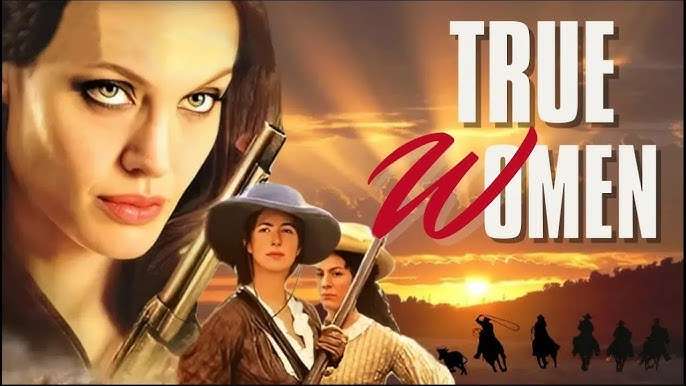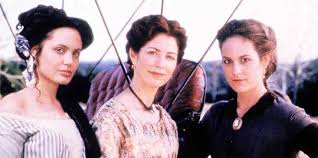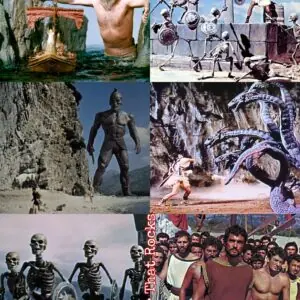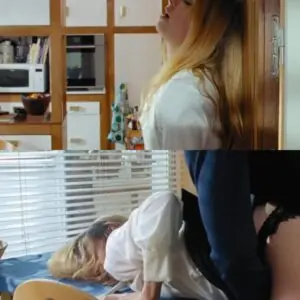Directed by Karen Arthur and based on Janice Woods Windle’s novel, True Women (1997) is a historical miniseries turned feature film that chronicles the lives of three women—Euphemia “Phemie” Ashby (Dana Delany), Georgia Lawshe Woods (Angelina Jolie), and Sarah McClure (Annabeth Gish)—as they navigate love, loss, and survival against the backdrop of 19th-century Texas. Ambitious in scope and rich in period detail, the film attempts to carve out a space for women’s stories in the traditionally male-dominated Western genre. While it suffers from uneven pacing and melodramatic tendencies, True Women remains a compelling, if imperfect, tribute to female endurance.
Plot and Structure: A Saga of Struggle and Sisterhood

Spanning several decades (from the Texas Revolution in the 1830s to post-Civil War Reconstruction), True Women stitches together the interconnected lives of its three heroines:
-
Euphemia “Phemie” Ashby (Dana Delany): A strong-willed Southern belle forced to rebuild her life after her family is massacred by Comanche raiders.
-
Georgia Lawshe Woods (Angelina Jolie): A fiery, independent woman who defies societal norms, becoming a key player in Texas’ fight for independence.
-
Sarah McClure (Annabeth Gish): A gentle but resilient schoolteacher whose idealism is tested by the brutalities of war and frontier life.
The film follows these women through pivotal historical moments—the fall of the Alamo, the Civil War, and the struggle for women’s rights—while emphasizing their personal battles against oppression, violence, and societal constraints.
Strengths of the Narrative
-
Historical Depth: The film does an admirable job of weaving real events into its fictional narrative, offering a glimpse into the often-overlooked roles women played in shaping the American West.
-
Female-Centric Perspective: Unlike traditional Westerns that glorify gunslingers and outlaws, True Women keeps its focus squarely on the emotional and physical labor of women surviving in a harsh, patriarchal world.
-
Strong Character Arcs: Each protagonist undergoes significant transformation, particularly Phemie, who evolves from a sheltered aristocrat into a hardened survivor.
Weaknesses of the Narrative

-
Pacing Issues: The film’s attempt to cover nearly 40 years in just over two hours results in rushed transitions and underdeveloped subplots. Certain events (like the Civil War) feel glossed over.
-
Melodrama Overload: Some scenes lean heavily into soap-opera theatrics, particularly in romantic subplots that could have been more nuanced.
-
Lack of Indigenous Perspectives: While Comanche attacks are a key plot point, the film does little to explore Native American experiences beyond the role of antagonists—a missed opportunity for deeper historical reflection.
Performances: A Mixed but Memorable Ensemble
Dana Delany as Euphemia Ashby
Delany delivers the film’s most grounded and emotionally resonant performance. Her portrayal of Phemie’s grief and gradual hardening is compelling, particularly in scenes where she must make ruthless decisions to protect her family.
Angelina Jolie as Georgia Lawshe Woods
Jolie, then on the cusp of superstardom, brings her trademark intensity to the role of Georgia. While occasionally veering into over-the-top theatrics (especially in her romantic scenes), she embodies the rebellious spirit of her character with conviction.
Annabeth Gish as Sarah McClure
Gish provides the film’s moral center, portraying Sarah with quiet dignity. Her storyline—particularly her advocacy for education and women’s rights—adds a necessary layer of idealism to the otherwise grim narrative.
Supporting Cast
-
Michael York as Bartlett McClure brings gravitas to his role as Sarah’s husband.
-
Tina Majorino (young Georgia) and Rachel Leigh Cook (young Sarah) shine in their limited screen time.
-
Jeffrey Nordling as Phemie’s love interest is serviceable, though his character feels underdeveloped.
Direction and Cinematography: A Handsomely Mounted Period Piece

Director Karen Arthur (Bella Mafia, The Rape of Richard Beck) crafts a visually lush film, with sweeping Texas landscapes captured beautifully by cinematographer Paul Elliott. The production design and costumes effectively evoke the era, though some battle scenes suffer from TV-movie-level staging (a holdover from its miniseries origins).
The film’s strongest visual moments are its quieter ones—women gathered in candlelit rooms, the vast emptiness of the frontier, the haunting aftermath of raids and battles. Unfortunately, some of the action sequences (particularly the Alamo scenes) feel constrained by budget limitations.
Themes: Resilience, Sisterhood, and the Cost of Freedom
At its core, True Women is about perseverance in the face of systemic oppression. Key themes include:
-
The Price of Survival: The film doesn’t shy away from showing the brutal sacrifices women made—whether through forced marriages, wartime trauma, or economic hardship.
-
Female Solidarity: While the women face rivalry and conflict, their eventual unity (especially in the suffrage subplot) is the film’s emotional backbone.
-
Reconstruction and Change: The post-Civil War segments highlight the slow, painful progress toward equality, mirroring real historical struggles.
Music and Score: A Serviceable but Unmemorable Backdrop
Lee Holdridge’s score is appropriately sweeping, with fiddle-heavy arrangements that evoke the frontier spirit. However, unlike iconic Western soundtracks (Dances with Wolves, The Good, the Bad and the Ugly), it lacks a distinctive thematic punch.
Historical Accuracy: A Mixed Bag
While True Women gets many period details right (the depiction of pioneer life, the impact of the Civil War on Texas families), it takes significant liberties for dramatic effect. Historians might balk at:
-
The compressed timeline of events.
-
The somewhat sanitized portrayal of slavery (though the film does briefly address it).
-
The oversimplification of Comanche conflicts.
That said, as a dramatization rather than a documentary, it succeeds in making history feel personal.
Final Verdict: A Flawed but Worthy Tribute to Women’s History
True Women is not a masterpiece. Its pacing issues, melodramatic tendencies, and occasional lack of depth prevent it from reaching the heights of classics like Little Women or Gone with the Wind. However, its ambition and commitment to telling women’s stories make it a worthwhile watch.
For fans of historical dramas, it offers a rare female perspective on the Old West. For Angelina Jolie completists, it’s a fascinating glimpse at her early career. And for anyone interested in stories of resilience, it delivers in spades.
Rating: 7/10
Best for: Fans of Dr. Quinn, Medicine Woman, Lonesome Dove, and North and South.
Takeaway: A flawed but earnest epic that proves the West wasn’t won by men alone.





